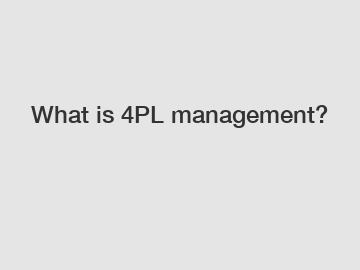What is 4PL management?
What is 4PL management?
4PL management refers to the fourth-party logistics management, which is an advanced form of supply chain management. It involves outsourcing all aspects of logistics management to an external party, who acts as the single point of contact and takes full responsibility for managing the entire supply chain operations.
The concept of 4PL management originated from the need to address the increasing complexity and challenges of supply chain management in today's globalized world. As supply chains become more intricate and interconnected, companies require a higher level of expertise and coordination to ensure efficient and effective operations.

In the past, companies often relied on third-party logistics (3PL) providers to handle specific logistics functions such as transportation or warehousing. However, as supply chains grew more complex, it became apparent that a more comprehensive and integrated approach was needed. This led to the emergence of 4PL management, where an external party takes full responsibility for managing and optimizing the entire supply chain.
The key rationale behind 4PL management is the realization that companies can leverage the expertise and resources of specialized logistics providers to achieve improved efficiency, cost reduction, and customer satisfaction. By outsourcing logistics management to a 4PL provider, companies can focus on their core competencies and strategic initiatives, while leaving the operational complexities to the experts.
The process of implementing 4PL management typically involves a detailed assessment of the company's supply chain processes, identifying areas for improvement, and designing a customized solution. The 4PL provider acts as a strategic partner, collaborating closely with the company to develop and implement strategies that optimize the supply chain operations.
One of the significant advantages of 4PL management is the ability to achieve economies of scale and scope. By outsourcing logistics management to a specialized provider, companies can benefit from the provider's extensive network of resources, technology, and expertise, which may otherwise be too costly or time-consuming to develop in-house. This enables companies to streamline their supply chain operations, reduce costs, and improve overall efficiency.
Furthermore, 4PL management enhances visibility and control over the supply chain. The 4PL provider acts as a central hub, integrating different systems and processes, and providing real-time visibility into the entire supply chain. This allows companies to track shipments, monitor inventory levels, and identify bottlenecks or inefficiencies promptly. With improved visibility, companies can make data-driven decisions, anticipate potential risks, and proactively address issues, resulting in better customer service and satisfaction.
In conclusion, 4PL management is an advanced approach to supply chain management that involves outsourcing all logistics functions to an external provider. It offers companies a comprehensive and integrated solution to address the complexities of the modern supply chain. By leveraging the expertise and resources of specialized providers, companies can achieve improved efficiency, cost reduction, and customer satisfaction. The adoption of 4PL management enables companies to focus on their core competencies while benefiting from the capabilities and scale provided by the 4PL provider.
Want more information on Logistics Software for eCommerce cost, parcel delivery software supplier, Parcel Fulfillment System create? Feel free to contact us.

Comments
0